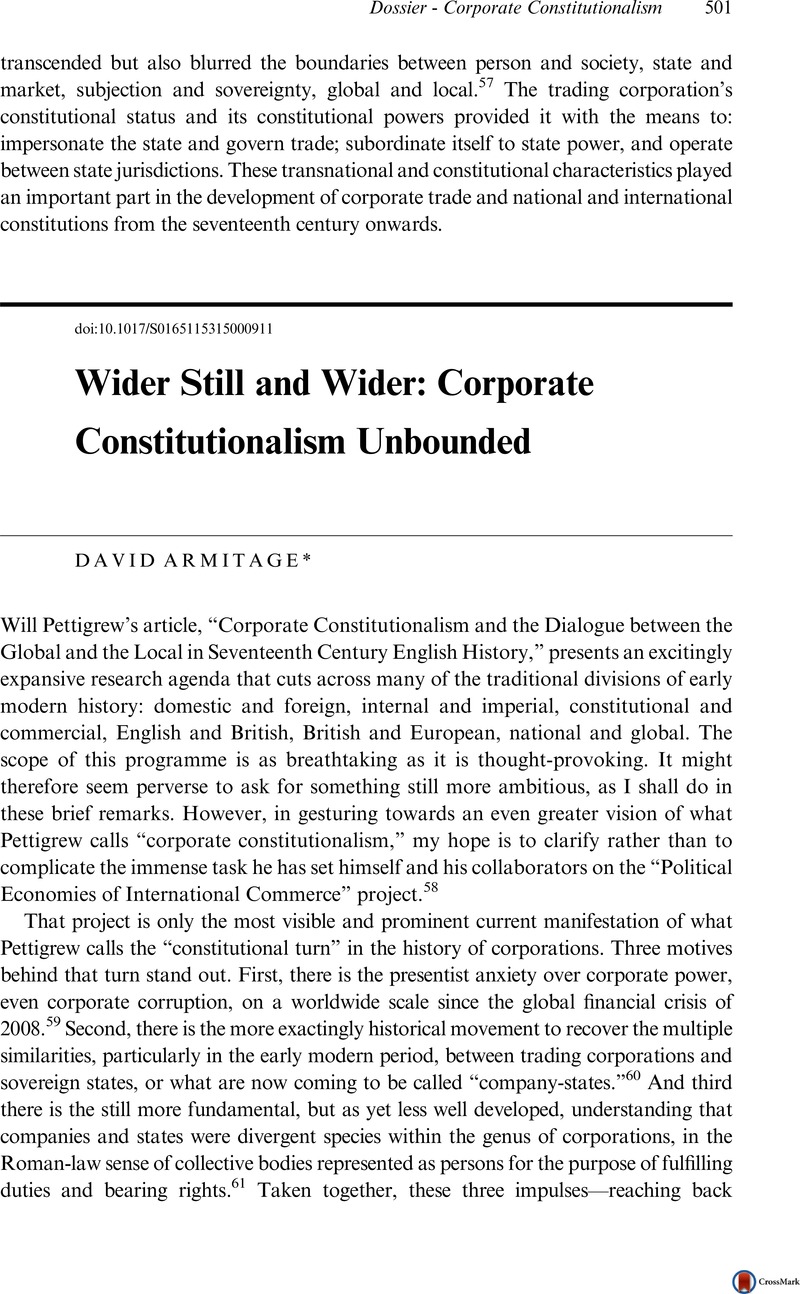No CrossRef data available.
Article contents
Wider Still and Wider: Corporate Constitutionalism Unbounded
Published online by Cambridge University Press: 18 January 2016
Abstract

- Type
- Articles
- Information
- Copyright
- © 2016 Research Institute for History, Leiden University
Footnotes
David Armitage is the Lloyd C. Blankfein Professor of History at Harvard University where he teaches intellectual history and international history.
References
58 University of Kent, “Political Economies of International Commerce”: http://peic.org.uk/.
59 Barkan, Corporate Sovereignty: Law and Government under Capitalism, is a sophisticated treatment explicitly tied to recent events.
60 Stern, The Company-State: Corporate Sovereignty and the Early Modern Foundations of the British Empire in India; Weststeijn, “The VOC as a Company-State: Debating Seventeenth-Century Dutch Colonial Expansion.”.
61 Maitland, Maitland: State, Trust and Corporation.
62 Robins, The Corporation that Changed the World: How the East India Company Shaped the Modern Multinational; Dalrymple, The Anarchy: How a Corporation Replaced the Mughal Empire, 1756–1803.
63 Willan, The Early History of the Russia Company, 1553–1603. A new history of the Muscovy Company is a major desideratum.
64 The East India Company Fine Foods: http://www.eicfinefoods.com/.
65 Ramsay, “Clothworkers, Merchant Adventurers, and Richard Hakluyt,” 504–21; on the London companies, 1400–1900, see “Records of London’s Livery Companies Online”: http://www.londonroll.org/home.
66 Malcolm, “Hobbes, Sandys, and the Virginia Company”; Jessen, “The State of the Company: Corporations, Colonies and Companies in Leviathan”; Springborg, “Hobbes, Donne and the Virginia Company: Terra Nullius and ‘The Bulimia of Dominion.’”
67 On consular jurisdiction, see especially Stein, “The Mediterranean and the English Empire of Trade, 1660–1748.”
68 Kupperman, Providence Island, 1630–1641: The Other Puritan Colony; Armitage, “Greater Britain: A Useful Category of Historical Analysis?” 441, and n. 72.
69 Gottmann, “French-Asian Connections: The Compagnie des Indes, France’s Eastern Trade, and New Directions in Historical Scholarship”; Cross, “The Compagnie des Indes and the Fate of Commercial Empire in the French Revolution.”
70 Greene, Peripheries and Center: Constitutional Development in the Extended Polities of the British Empire and the United States, 1607–1788; Colley, “Empires of Writing: Britain, America and Constitutions, 1776–1848.”
71 Handlin and Handlin, “Origins of the American Business Corporation”; Kaufman, “Corporate Law and the Sovereignty of States.”
72 Hont, Jealousy of Trade: International Competition and the Nation-state in Historical Perspective; Grewal, The Invention of the Economy: The Origins of Economic Thought.


